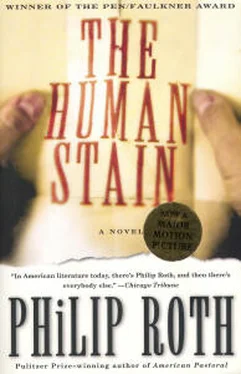Within the four square miles of this residential flyspeck of a Jersey town of not quite seventy thousand people, as throughout the country during Coleman's youth, there existed these rigid distinctions between classes and races sanctified by the church and legitimized by the schools. Yet on the Silks' own modest tree-lined side street ordinary people needed not to be quite so responsible to God and the state as those whose vocation it was to maintain a human community, swimming pool and all, untainted by the impurities, and so the neighbors were on the whole friendly with the ultra-respectable, light-skinned Silks — Negroes, to be sure, but, in the words of one tolerant mother of a kindergarten playmate of Coleman's, “people of a very pleasing shade, rather like eggnog”—even to the point of borrowing a tool or a ladder or helping to figure out what was wrong with the car when it wouldn't start. The big apartment house at the corner remained all white until after the war. Then, in late 1945, when colored people began coming in at the Orange end of the street — the families of professional men mainly, of teachers, doctors, and dentists — there was a moving van outside the apartment building every day, and half the white tenants disappeared within months. But things soon settled down, and, though the landlord of the apartment building began renting to colored just in order to keep the place going, the whites who remained in the immediate neighborhood stayed around until they had a reason other than Negrophobia to leave.
Go to work. And he rang the doorbell and pushed open the front door and called, “We're here.”
Walt had been unable to make it up that day from Asbury Park but there, coming out of the kitchen and into the hallway, were his mother and Ernestine. And here, in their house, was his girl. She may or may not have been what they were expecting. Coleman's mother hadn't asked. Since he'd unilaterally made his decision to join the navy as a white man, she hardly dared ask him anything, for fear of what she might hear. She was prone now, outside the hospital — where she had at last become the first colored head floor nurse of a Newark hospital, and without help from Dr. Fensterman — to let Walt take charge of her life and of the family altogether. No, she hadn't asked anything about the girl, politely declined to know, and encouraged Ernestine not to inquire. Coleman, in turn, hadn't told anyone anything, and so, fair-complexioned as fair could be, and — with her matching blue handbag and pumps, in her cotton floral shirtwaist dress and her little white gloves and pillbox hat — as immaculately trim and correct as any girl alive and young in 1950, here was Steena Palsson, Iceland and Denmark's American progeny, of the bloodline going back to King Canute and beyond.
He had done it, got it his own way, and no one so much as flinched. Talk about the ability of the species to adapt. Nobody groped for words, nobody went silent, nor did anyone begin jabbering a mile a minute. Commonplaces, yes, cornballisms, you bet — generalities, truisms, clichés aplenty. Steena hadn't been raised along the banks of the Otter Tail River for nothing: if it was hackneyed, she knew how to say it. Chances were that if Coleman had gotten to blindfold the three women before introducing them and to keep them blindfolded throughout the day, their conversation would have had no weightier a meaning than it had while they smilingly looked one another right in the eye. Nor would it have embodied an intention other than the standard one: namely, I won't say anything you can possibly take offense with if you won't say anything I can take offense with. Respectability at any cost — that's where the Palssons and the Silks were one.
The point at which all three got addled was, strangely enough, while discussing Steena's height. True, she was five eleven, nearly three full inches taller than Coleman and six inches taller than either his sister or his mother. But Coleman's father had been six one and Walt was an inch and a half taller than that, so tallness in and of itself was nothing new to the family, even if, with Steena and Coleman, it was the woman who happened to be taller than the man. Yet those three inches of Steena's — the distance, say, from her hairline to her eyebrows — caused a careening conversation about physical anomalies to veer precipitously close to disaster for some fifteen minutes before Coleman smelled something acrid and the women — the three of them — rushed for the kitchen to save the biscuits from going up in flames.
After that, throughout dinner and until it was time for the young couple to return to New York, it was all unflagging rectitude, externally a Sunday like every nice family's dream of total Sunday happiness and, consequently, strikingly in contrast with life, which, as experience had already taught even the youngest of these four, could not for half a minute running be purged of its inherent instability, let alone be beaten down into a predictable essence.
Not until the train carrying Coleman and Steena back to New York pulled into Pennsylvania Station early that evening did Steena break down in tears.
As far as he knew, until then she had been fast asleep with her head on his shoulder all the way from Jersey — virtually from the moment they had boarded at Brick Church Station sleeping off the exhaustion of the afternoon's effort at which she had so excelled.
“Steena — what is wrong?”
“I can't do it!” she cried, and, without another word of explanation, gasping, violently weeping, clutching her bag to her chest — and forgetting her hat, which was in his lap, where he'd been holding it while she slept — she raced alone from the train as though from an attacker and did not phone him or try ever to see him again.
It was four years later, in 1954, that they nearly collided outside Grand Central Station and stopped to take each other's hand and to talk just long enough to stir up the original wonder they'd awakened in each other at twenty-two and eighteen and then to walk on, crushed by the certainty that nothing as statistically spectacular as this chance meeting could possibly happen again. He was married by then, an expectant father, in the city for the day from his job as a classics instructor at Adelphi, and she was working in an ad agency down the street on Lexington Avenue, still single, still pretty, but womanly now, very much a smartly dressed New Yorker and clearly someone with whom the trip to East Orange might have ended on a different note if only it had taken place further down the line.
The way it might have ended — the conclusion against which reality had decisively voted — was all he could think about. Stunned by how little he'd gotten over her and she'd gotten over him, he walked away understanding, as outside his reading in classical Greek drama he'd never had to understand before, how easily life can be one thing rather than another and how accidentally a destiny is made ... on the other hand, how accidental fate may seem when things can never turn out other than they do. That is, he walked away understanding nothing, knowing he could understand nothing, though with the illusion that he would have metaphysically understood something of enormous importance about this stubborn determination of his to become his own man if ... if only such things were understandable.
The charming two-page letter she sent the next week, care of the college, about how incredibly good he'd been at “swooping” their first time together in his Sullivan Street room—“swooping, almost like birds do when they fly over land or sea and spy something moving, something bursting with life, and dive down ... and seize upon it”—began, “Dear Coleman, I was very happy to see you in New York. Brief as our meeting was, after I saw you I felt an autumnal sadness, perhaps because the six years since we first met make it wrenchingly obvious how many days of my life are ‘over.’ You look very good, and I'm glad you're happy...” and ended in a languid, floating finale of seven little sentences and a wistful closing that, after numerous rereadings, he took as the measure of her regret for her loss, a veiled admission of remorse as well, poignantly signaling to him a subaudible apology: “Well, that's it. That's enough. I shouldn't even bother you. I promise I won't ever again. Take care. Take care. Take care. Very fondly, Steena.”
Читать дальше












